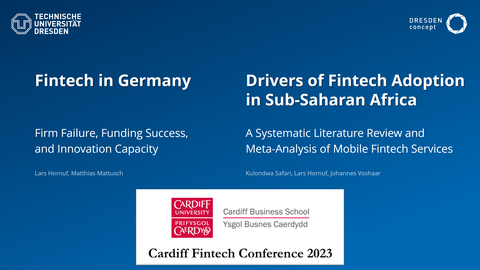Nov 20, 2023
Cardiff FinTech Conference 2023
Matthias Mattusch presented a new working paper co-authored with Lars Hornuf on FinTech startups in Germany at the 2nd International Cardiff Fintech Conference, which explores the promise of fintechs to revolutionize the financial world. Hornuf and Mattusch first document firm failure, funding success, and innovation capacity in the opaque fintech startup market. Using a hand-collected dataset of 892 German fintechs founded between 2000 and 2021, which includes detailed founder and company information, they find that founders with a business degree and entrepreneurial experience have a better chance of obtaining funding, while founder teams with science, technology, engineering, or mathematics backgrounds file more patents. Early third-party endorsements and foreign partnerships substantially increases firm survival. Moreover, they obtain the following stylized facts: Fintechs focusing on business-to-business models and which position themselves as technical providers have proven more effective. Fintechs competing in segments traditionally attributed to banks are generally less successful and less innovative.
You can access the working paper on SSRN.
Kulondwa Safari presented a working paper entitled "Drivers of Fintech Adoption in Sub-Saharan Africa: A Systematic Literature Review and Meta-Analysis of Mobile Fintech Services" at the 2nd Cardiff Fintech Conference at Cardiff Business School in the United Kingdom. The paper is written with two co-authors, Professor Lars Hornuf from TU Dresden and Johannes Voshaar from the University of Bremen. The paper investigates the determinants of adoption of mobile fintech services (mobile money, mobile banking, internet banking, and e-wallet) in Sub-Saharan Africa, which is the region with the largest population without access to financial services. We summarize the extensive previous empirical research through a systematic literature review and find that the most important determinants of mobile fintech adoption in Sub-Saharan Africa are perceived ease of use and perceived usefulness. There is little research focused on how the supply side drives fintech adoption. Furthermore, studies that rely on large-scale field experiments to understand adoption behavior are underrepresented in the literature.

